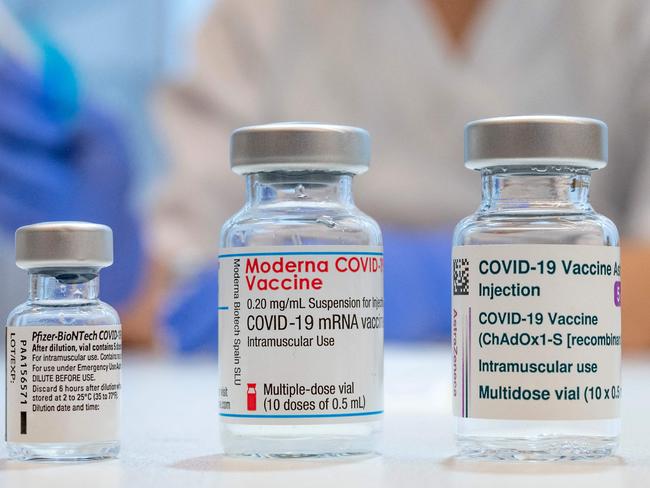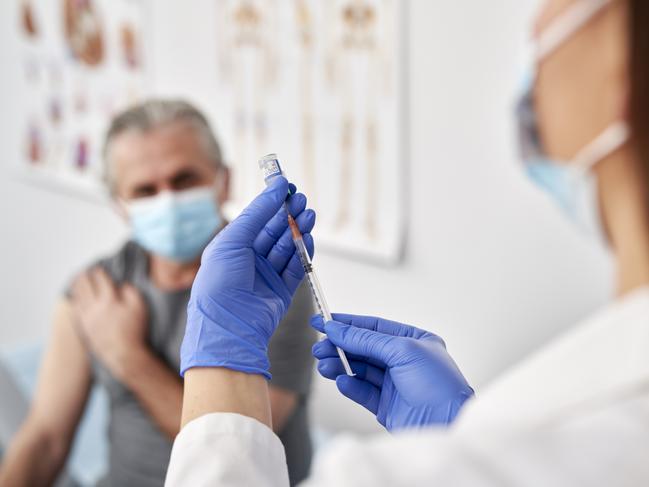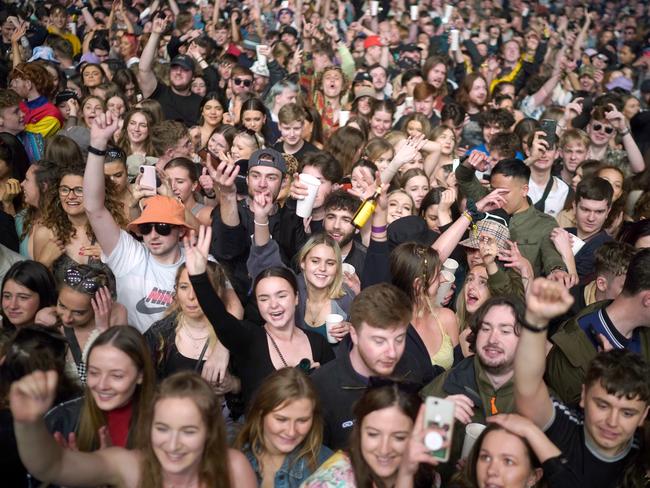Australians’ COVID-19 vaccine questions answered by experts
From whether you can mix and match vaccines, to what variants you’ll be protected against, here are the answers to Australia’s top COVID jab questions.
Coronavirus
Don't miss out on the headlines from Coronavirus. Followed categories will be added to My News.
Professor Terry Nolan, Head of Vaccine and Immunisation Research Group at The Doherty Institute and Professor Allen Cheng, Professor of Infectious Diseases Epidemiology at Monash University and Chair of the Advisory Committee for Vaccines answer all of your questions around the COVID-19 vaccine.
CAN I GET ONE TYPE OF COVID VACCINATION TO START WITH AND THEN ANOTHER LATER, EG, ASTRAZENECA THEN PFIZER?
It is not recommended at this time. Studies are underway in the UK to see if ‘mixing schedules’ using a different vaccine for the second dose is safe and/or provides the same or better immune response. Health Department Chief Professor Brendan Murphy last week greenlighted mixing schedules for the booster vaccine. While most Australians will get an AstraZeneca or Pfizer vaccine next year we’ll start receiving a booster dose made by a third company- Moderna- to protect against mutant variants from the UK, South Africa and Brazil. There is no scientific reason not to mix vaccines and it might be more effective, Professor Murphy has said. However, the government still wants to wait for clinical trial results from the UK on whether mixing the first two doses of the vaccine will work before approving it.
HOW EFFECTIVE ARE THE COVID VACCINES AT STOPPING TRANSMISSION?
The first two studies of transmission within households comparing vaccinated against non-vaccinated household members have shown that both the Pfizer and AZ vaccines are about 50 per cent effective at preventing transmission from a vaccinated person who has been exposed to the virus. This is very good, but it is not perfect.


WHICH VARIANTS DOES EACH VACCINE PROTECT YOU AGAINST?
Pfizer is 89.5 per cent effective against the UK variants and 75 per cent effective against the South African variants.The company ids developing a booster doe.
AstraZeneca is 75 per cent effective against the UK variant and only 10 per cent effective against the South Africa variant. The company is working on a booster dose.
Novavax is 85.6 per cent effective against the UK variant and 60 per cent effective against the South African variant
Moderna in a test tube produced antibodies against both the UK and South African variants but the response was lower to the South African one. This company is currently testing a booster dose against the South African version Australia has a contract to purchase it.
CAN I STILL GET COVID IF I AM FULLY VACCINATED?
Yes. But if you do, the risk of severe infection is much smaller. Last month six people in hotel quarantine in NSW caught COVID-19 despite being fully vaccinated. One had received Johnson & Johnson’s vaccine the others had received both doses of a two-shot vaccine, such as Pfizer, AstraZeneca or Moderna. Two others were fully vaccinated but were exposed to COVID-19 within 14 days of their second dose. In New Zealand a vaccinated baggage handler caught COVID-19. Seychelles which leads the world in vaccinating its citizens had a COVID-19 outbreak this month that produced a higher rate of infections per head of population than India. More than one in three infected people in Seychelles had received two doses of a vaccine. Most of the cases were mild and very few people have died. Around 60 percent of vaccinated people in Seychelles received vaccines made by the Chinese company Sinopharm and 43 per cent received the AstraZeneca jab.

CAN I CONTINUE TAKING OTHER MEDICATIONS BEFORE AND AFTER I HAVE HAD THE COVID JAB (EG ASPIRIN FOR BLOOD PRESSURE)?
In general yes, but if you have any concerns, talk to your doctor and let the immunisation provider know. The main medication that they need to know about are anticoagulants (eg warfarin) so the vaccinators can take extra care to avoid bleeding after the injection.
AM I BETTER OFF WAITING TO GET A MORE SOPHISTICATED COVID VACCINE CANDIDATE?
No. Get vaccinated as soon as you can to protect yourself and contribute to the protection of the whole community. Australians over the age of 50 are most at risk from COVID-19 and regular virus outbreaks from hotel quarantine are the reason to get the shot now because good supply of Pfizer and Moderna vaccines won’t be here until after October.
DO YOU HAVE TO WAIT THE EXACT PERIOD SPECIFIED BETWEEN GETTING THE JABS (EG THREE MONTHS FOR ASTRAZENECA? DOES THIS ENHANCE THE EFFICACY?
No. The TGA has licensed the AZ vaccine for a second dose any time from four weeks to three months or more for the second dose. However, we know that around three months gives the best protection. If for some specific reason, you require a second dose before three months (e.g. necessary travel), you can seek approval from the immunising centre or GP you attend.
WHAT IS THE RISK OF THE RARE BLOOD CLOT?
As of May 13, 18 vaccinated Australians had been diagnosed with rare blood clots or suspected clots out of 1.8 million people who received the jab, a rate of one per 100,000. European data suggests the risk is around 2 per 100,000, and is slightly lower in older people. To give you an idea of this risk, if a grand final crowd at the MCG all got vaccinated, perhaps about 1-3 people might get this complication.

IS THE RISK THE SAME FOR CLOTS IN UNDER 50 AS IT IS IN OVER 50?
The risk is around 2 per 100,000 in those under 50. So if everyone at the MCG was in this age group and vaccinated just two of them would get a clot. For those aged 50-70 the risk is around 1 per 100,000 so if everyone at the MCG was in this aged group and vaccinated only one person would get a clot. For those aged over 70 the risk is even lower at 0.5 per 100,000 so you would have to fill .
FOR AN OVER 50, WHAT IS THE RISK OF DYING FROM THE BLOOD CLOT COMPLCATION?
Only one Australian has died from rare blood clots associated with the vaccine - a 48 year old diabetic woman from NSW. All the others with the condition are stable and recovering. Although Thrombosis with Thrombocytopenia Syndrome associated with the AstraZeneca vaccine is rare, it is a serious complication. One in five patients who got this condition have died in the UK. But just adding up those last two figures – if a million people got vaccinated with AZ (about twice the population of Tasmania, or half the population of Perth), around 20 might get this complication and four of these might die.
CAN I GET A DIFFERENT VACCINE TO THE ONE MY AGE GROUP IS MEANT TO (EG. IF OVER 50 YEARS, COULD I GET PFIZER IF I WANTED AND NOT ASTRAZENECA?
Pfizer has been given priority for those under 50 – health care workers first then those with medial conditions. For those over 50, the choice is to get the AstraZeneca one now or wait for another vaccine further down the track. Pfizer and Moderna won’t be available in large quantities until after October, Novavax is still in clinical trials and has struck production problems but it too will not be delivered until much later this year.
If I am over 50, can I request Pfizer if I had fears about blood clots?
For those over 50, AstraZeneca is available now, but you will have to wait for another vaccine (Pfizer, or Moderna or perhaps Novavax) if you have those concerns and that may take many months.
CAN THE VACCINE SHED THE VIRUS?
No. The vaccine is not the COVID virus.
IS THERE EVIDENCE OVERSEAS THAT VACCINATION IS WORKING?
Yes. There is overwhelming evidence from the UK, Israel, the US and elsewhere that the vaccine has been extraordinarily successful. Israel has vaccinated more than 60 per cent of its population with the Pfizer vaccine, fewer than 100 new cases are being recorded daily and only 2-5 people have died or been admitted to ICU.COVID-19 deaths in the UK have plunged from a peak of 1820 in mid-January 10 11 per day and only 106 people a day are being admitted to hospital down from over 4,000 a day in January as a result of a lockdown and a determined vaccine rollout. More than half (52.1 per cent) of the UK population has been given at least one dose of a COVID-19 vaccine.

DO WE STILL HAVE TO SOCIAL DISTANCE?
While the vaccines are very good at preventing illness, they are not perfect at preventing you transmitting the virus to someone else. Recent household transmission studies from the UK suggest the vaccine effectiveness against transmission is about 50%. If you’re exposed to an infected person, you can still acquire the virus from them. You will likely not have any symptoms, but until the virus is completely eliminated by your immune system (it could take a few days), you could pass it on to a vulnerable and unvaccinated person.
In Australia, the risk is virus escape from quarantine of imported coronavirus in returning travellers. Quarantine is never going to be 100 percent reliable. Hence, the need for social distancing remains, at least until we have a very high percentage of the population vaccinated.
DO WE HAVE MORE DETAILS ABOUT THE VACCINE USE IN PREGNANCY?
A number of studies have shown no ill effects of women who have received COVID vaccines. Ongoing pregnancy registry studies continue. Pregnant women considering vaccination should talk to their doctor.
More Coverage
Originally published as Australians’ COVID-19 vaccine questions answered by experts
Read related topics:COVID-19 Vaccine




